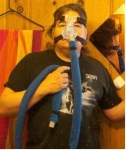Question for ASV users
Question for ASV users
deleted due to only one person being kind enough to respond.
_________________
| Mask: Wisp Nasal CPAP Mask with Headgear - Fit Pack |
| Additional Comments: PR System One Remstar BiPap Auto AS Advanced. |
Last edited by Mary Z on Fri Dec 09, 2011 7:31 am, edited 1 time in total.
Dog is my copilot
Re: Question for ASV users
I was titrated in the sleep lab at the VA on an ASV last June and they gave me an EPAPmin of 7 and an IPAPmin of 5.
On those settings, I had some 5's and under, but they were few and far between. In Sept and Oct, my AHI's for some reason starting increasing and AHI's in the teens were getting frequent. Even hit a 20. I knew there was no way I'd be able to get back in for another titration, so I just raised my IPAPmin to 7. Since that change, I have not once had over a 5 and the majority of my AHI's are 2 to 3.
I hope somehow there is some help in that! Good luck
On those settings, I had some 5's and under, but they were few and far between. In Sept and Oct, my AHI's for some reason starting increasing and AHI's in the teens were getting frequent. Even hit a 20. I knew there was no way I'd be able to get back in for another titration, so I just raised my IPAPmin to 7. Since that change, I have not once had over a 5 and the majority of my AHI's are 2 to 3.
I hope somehow there is some help in that! Good luck
Thinking of quitting CPAP?
No problem, here's the first thing to do when you quit:
Advanced funeral planning. When you give up CPAP, you'll probably need it.
No problem, here's the first thing to do when you quit:
Advanced funeral planning. When you give up CPAP, you'll probably need it.
Re: Question for ASV users
Sure wish I knew what the question was.
Diagnosed 9/4/07
Sleep Study Titrated to 19 cm H2O
Rotating between Activa and Softgel
11/2/07 RemStar M Series Auto with AFlex 14-17
10/17/08 BiPAP Auto SV 13/13-23, BPM Auto, AHI avg <1
Sleep Study Titrated to 19 cm H2O
Rotating between Activa and Softgel
11/2/07 RemStar M Series Auto with AFlex 14-17
10/17/08 BiPAP Auto SV 13/13-23, BPM Auto, AHI avg <1
Re: Question for ASV users
I'm sorry me too, I didn't see it either. However going on strictly Ken's response I'll go along those same lines if it helps at all.OutaSync wrote:Sure wish I knew what the question was.
Was diagnosed with OSA and at the sleep lab AHI's of 30. They put me on straight CPAP for a couple weeks and that induced Centrals, so they changed my diagnosis to Complex Sleep Apena. (never was one to follow the crowd).
Was given an ASV with generic settings on it to speed up the process, and was told they would tweak the settings on it if need be. Feel much better with the ASV and it's very easy to breath with compared to the CPAP I started with. However still need to find the optimal settings because now I have what I call "Slot Machine AHI's ". One night I go to bed and wake up with an AHI of 4. the very next night wake up with a 12. Have one more appointment with the Sleep Dept. and then will continue adjusting on my own as they seem to be stumped.
Good luck if your stepping up to an ASV unit, they are more complicated but when you need one, you need one.
Complex Sleep Apnea
Re: Question for ASV users
It was: "Does ASV make you fart?"OutaSync wrote:Sure wish I knew what the question was.
.
It is easy to be brave from a safe distance - Aesop
.
It is easy to be brave from a safe distance - Aesop
.
Re: Question for ASV users
Hi, Mary. I didn't respond because I'm not an ASV user. There is a possibility that at least some ASV users didn't have a solid answer. Others didn't get a chance to see the question. Despite the many ASV threads I have read and participated in, I didn't have what I felt was a good answer to share... If I were an ASV user, I would at least have an anecdote.
If I recall correctly the question had to do with wondering whether ASV could improve your daytime EDS. You offered that your treated AHI frequently runs a little high, but that your doctor attributes that slightly-elevated residual AHI to medications. I was hoping some of the posters here could offer opinions or ideas. I hope you don't mind my attempting to summarize. Yours seemed to me like an excellent question...
Are there other ideas or anecdotes from the ASV crowd?
If I recall correctly the question had to do with wondering whether ASV could improve your daytime EDS. You offered that your treated AHI frequently runs a little high, but that your doctor attributes that slightly-elevated residual AHI to medications. I was hoping some of the posters here could offer opinions or ideas. I hope you don't mind my attempting to summarize. Yours seemed to me like an excellent question...
Are there other ideas or anecdotes from the ASV crowd?
Re: Question for ASV users
There's so few of us who use ASV's. To add to it, the breathing disorders that require ASV's are more complex and I think even fewer of us know much about them. Plus, the ASV machines are also more complex making them more difficult to understand how they operate with our breathing. So, getting answers to ASV questions are more difficult.
I try to jump into the forum at least once or twice a day so hopefully I can 'pay it forward' with whatever little info I've learned in the hopes that someone else may find that info useful.
I try to jump into the forum at least once or twice a day so hopefully I can 'pay it forward' with whatever little info I've learned in the hopes that someone else may find that info useful.
Thinking of quitting CPAP?
No problem, here's the first thing to do when you quit:
Advanced funeral planning. When you give up CPAP, you'll probably need it.
No problem, here's the first thing to do when you quit:
Advanced funeral planning. When you give up CPAP, you'll probably need it.
- JohnBFisher
- Posts: 3821
- Joined: Wed Oct 14, 2009 6:33 am
Re: Question for ASV users
Greetings Mary! I also apologize that I did not respond. I fear that your question came at a time when I was more than a little "down in the dumps". Nothing serious, but just did not feel like doing anything for a few days.
From the post from -SWS, I will try to answer your questions.
First of all, as others have noted, please be patient, since there are so few of us who deal with ASV units. We do try to help one another. But with the small number, it's all too possible we just won't respond as quickly as you might like. Not a lack of interest. Just a lack of numbers.
Now, specifically to address your questions about the excessive daytime sleepiness and the residual apneas that your doctor suspects is due to medication, I can offer the following thoughts. First, if you have an AHI that include central apneas (typically over 5 per hour), then your doctor might consider prescribing an ASV unit. Though the ASV unit is a very proactive unit that addresses most apneas (obstructive and central), it is so expensive that most insurance companies (and even public providers in other nations) only use these units if there are central apneas. Just as a comparison, a typical "good" CPAP unit costs $500. However, a typical ASV unit costs $5,000. That's quite a bit more expensive.
So, in short, if you doctor observes central sleep apneas, then your doctor may consider prescribing an ASV unit. And don't be afraid to push for it. Untreated apneas (whether obstructive or central) can lead to SERIOUS health issues - as you know. The resulting excessive daytime sleepiness (EDS) is bad enough in its own right - leading to serious auto accidents. But the untreated apneas can also lead to uncontrollable high blood pressure, diabetes, stokes, heart attacks, kidney damage. And you do NOT want to be on that path. If need be, you should *insist* that your doctor help you address your EDS.
However, having said all that, an ASV unit can make a huge difference with all your symptoms. I had severe central sleep apnea (with the sleep transition being worse - and much more pronounced than most people experience). With my ASV unit, I typically have an AHI of less than 2. When my sleep is fairly normal then I awaken feeling well rested and able to conquer the day.
Unfortunately, due to my neurological problems, I do not always attain good sleep. My sleep architecture is often abnormal due to my neurological issues (degeneration of the brain stem and cerebellum). So, I use medication to help me attain deeper sleep.
An ASV unit is not necessarily a "cure all". But it does do a good job. So, if you continue to struggle with EDS *and* you have central sleep apneas, then do discuss this as an option with your doctor. If your doctor does not want to address techniques (ASV or otherwise) to help reduce your AHI value, then you probably should look for another doctor.
Hope that helps.
From the post from -SWS, I will try to answer your questions.
First of all, as others have noted, please be patient, since there are so few of us who deal with ASV units. We do try to help one another. But with the small number, it's all too possible we just won't respond as quickly as you might like. Not a lack of interest. Just a lack of numbers.
Now, specifically to address your questions about the excessive daytime sleepiness and the residual apneas that your doctor suspects is due to medication, I can offer the following thoughts. First, if you have an AHI that include central apneas (typically over 5 per hour), then your doctor might consider prescribing an ASV unit. Though the ASV unit is a very proactive unit that addresses most apneas (obstructive and central), it is so expensive that most insurance companies (and even public providers in other nations) only use these units if there are central apneas. Just as a comparison, a typical "good" CPAP unit costs $500. However, a typical ASV unit costs $5,000. That's quite a bit more expensive.
So, in short, if you doctor observes central sleep apneas, then your doctor may consider prescribing an ASV unit. And don't be afraid to push for it. Untreated apneas (whether obstructive or central) can lead to SERIOUS health issues - as you know. The resulting excessive daytime sleepiness (EDS) is bad enough in its own right - leading to serious auto accidents. But the untreated apneas can also lead to uncontrollable high blood pressure, diabetes, stokes, heart attacks, kidney damage. And you do NOT want to be on that path. If need be, you should *insist* that your doctor help you address your EDS.
However, having said all that, an ASV unit can make a huge difference with all your symptoms. I had severe central sleep apnea (with the sleep transition being worse - and much more pronounced than most people experience). With my ASV unit, I typically have an AHI of less than 2. When my sleep is fairly normal then I awaken feeling well rested and able to conquer the day.
Unfortunately, due to my neurological problems, I do not always attain good sleep. My sleep architecture is often abnormal due to my neurological issues (degeneration of the brain stem and cerebellum). So, I use medication to help me attain deeper sleep.
An ASV unit is not necessarily a "cure all". But it does do a good job. So, if you continue to struggle with EDS *and* you have central sleep apneas, then do discuss this as an option with your doctor. If your doctor does not want to address techniques (ASV or otherwise) to help reduce your AHI value, then you probably should look for another doctor.
Hope that helps.
_________________
| Mask: Quattro™ FX Full Face CPAP Mask with Headgear |
| Additional Comments: User of xPAP therapy for over 20 yrs. Resmed & Respironics ASV units with EEP=9cm-14cm H2O; PSmin=4cm H2O; PSmax=15cm H2O; Max=25cm H2O |
"I get up. I walk. I fall down. Meanwhile, I keep dancing” from Rabbi Hillel
"I wish to paint in such a manner as if I were photographing dreams." from Zdzisław Beksiński
"I wish to paint in such a manner as if I were photographing dreams." from Zdzisław Beksiński
Re: Question for ASV users
Thanks, in spite of my childishness (exceeded only by Rocklin- thanks for the lousy joke, baby boy) I got my questions answered.
_________________
| Mask: Wisp Nasal CPAP Mask with Headgear - Fit Pack |
| Additional Comments: PR System One Remstar BiPap Auto AS Advanced. |
Last edited by Mary Z on Sat Dec 10, 2011 2:27 pm, edited 1 time in total.
Dog is my copilot
Re: Question for ASV users
One problem with having central or complex sleep apnea is that underlying it is a problem with improper handling of CO2 signals in our blood. When I first went in to get my ASV, my DME told me it would take 6 months or more of good sleep before the body resets its expectations with respect to CO2 levels in the blood. The idea seemed to be that the body gets used to having high CO2 levels (hypercapnea). Getting proper sleep with full oxygenation of the blood is supposed to reset those expectations.
I am winging it here but this is my best guess about how this happens. A person with central sleep apnea gets used to having high CO2 in the blood. Another person with obstructive sleep apnea also tends to adapt the same way. So, when it comes time for treatment, the extra ventilation provided by CPAP takes away effectively, more CO2 from the blood than when untreated. The patient then starts having induced centrals because their body was acclimated to expecting higher CO2 levels to activate respiratory drive and now they are being lowered by proper supply of air. For those with higher therapy pressures, the CO2 removal is greater and this suppresses the respiratory drive because the untreated patient had become acclimated to unnaturally high blood CO2.
According to my DME, the good news is that over time, with therapy, our bodies tend to reset their CO2 expectations and become more responsive to CO2 accumulating in the blood and induced central events will become less frequent.
My sleep study showed me having 59 central events an hour without therapy and at all CPAP and BIPAP pressures the central events increased. This is probably because CPAP and BIPAP were lowering my CO2 levels but my body was acclimated to expecting very high CO2 levels before it would signal to breath. So, CPAP and BIPAP made a bad situation worse and it got additionally worse at higher pressures (because that removed even more CO2).
My voiced concern at the time was that I was scared of even falling asleep because as the day went on, as I became tired, I could tell I was having breathing interruptions even while awake. So this was freaking me out a little. I find now after a year of ASV therapy, that for a normal day I am not having that experience. So some progress has been made. If I am excessively tired from staying up to late reading or networking (2-3 am), then it starts up but even then not as severely as before.
In my own self, I have observed that its easier to fall asleep because my respiratory drive seems to be stronger and my diaphram muscles seem to also have gotten stronger. I used ot not be able to sleep on my side and now I am finding more and more that I keep breathing if I turn to one side or the other. So, yes, over time it appears that therapy has helped my body reset the CO2 target necessary to trigger a breath, to lower CO2 levels.
I am winging it here but this is my best guess about how this happens. A person with central sleep apnea gets used to having high CO2 in the blood. Another person with obstructive sleep apnea also tends to adapt the same way. So, when it comes time for treatment, the extra ventilation provided by CPAP takes away effectively, more CO2 from the blood than when untreated. The patient then starts having induced centrals because their body was acclimated to expecting higher CO2 levels to activate respiratory drive and now they are being lowered by proper supply of air. For those with higher therapy pressures, the CO2 removal is greater and this suppresses the respiratory drive because the untreated patient had become acclimated to unnaturally high blood CO2.
According to my DME, the good news is that over time, with therapy, our bodies tend to reset their CO2 expectations and become more responsive to CO2 accumulating in the blood and induced central events will become less frequent.
My sleep study showed me having 59 central events an hour without therapy and at all CPAP and BIPAP pressures the central events increased. This is probably because CPAP and BIPAP were lowering my CO2 levels but my body was acclimated to expecting very high CO2 levels before it would signal to breath. So, CPAP and BIPAP made a bad situation worse and it got additionally worse at higher pressures (because that removed even more CO2).
My voiced concern at the time was that I was scared of even falling asleep because as the day went on, as I became tired, I could tell I was having breathing interruptions even while awake. So this was freaking me out a little. I find now after a year of ASV therapy, that for a normal day I am not having that experience. So some progress has been made. If I am excessively tired from staying up to late reading or networking (2-3 am), then it starts up but even then not as severely as before.
In my own self, I have observed that its easier to fall asleep because my respiratory drive seems to be stronger and my diaphram muscles seem to also have gotten stronger. I used ot not be able to sleep on my side and now I am finding more and more that I keep breathing if I turn to one side or the other. So, yes, over time it appears that therapy has helped my body reset the CO2 target necessary to trigger a breath, to lower CO2 levels.
EPAP min=6, EPAP max=15, PS min=3, PS max=12, Max Pressure=30, Backup Rate=8 bpm, Flex=0, Rise Time=1,
90% EPAP=7.0, Avg PS=4.0, Avg bpm 18.3, Avg Min vent 9.2 Lpm, Avg CA/OA/H/AHI = 0.1/0.1/2.1/2.3 ... updated 02/17/12
90% EPAP=7.0, Avg PS=4.0, Avg bpm 18.3, Avg Min vent 9.2 Lpm, Avg CA/OA/H/AHI = 0.1/0.1/2.1/2.3 ... updated 02/17/12
Re: Question for ASV users
Another thing, all other things being equal, increasing altitude makes for faster breathing, because the carotid bodies sense a decrease in oxygen and call for more respiration. But that in turn flushes CO2 out of our blood which reduces respiratory drive because there are other sensors in the carotid bodies, aortic bodies and medulla oblongata that respond to CO2 levels. In general, we have a more sensitive response to CO2 than we do to oxygen and that is what gets us into trouble.
You will also notice in peoples ASV graphs an initial drop in patient triggered breaths as we transition from waking to sleep. Apparently respiration gets handled differently when we fall asleep and there is particular respiratory instability during transition.
Stumbled across this article and its full of interesting bits...
http://www.jthoracdis.com/article/view/168/343
Below are some bits I have gleaned from Wiki that relate to Oxygen and CO2 regulation...
http://en.wikipedia.org/wiki/Effects_of ... _on_humans
This link shows how CO2 in the blood is tied in with our breathing
http://en.wikipedia.org/wiki/Respiratory_alkalosis
http://en.wikipedia.org/wiki/Carotid_bodies
http://en.wikipedia.org/wiki/Aortic_body
You will also notice in peoples ASV graphs an initial drop in patient triggered breaths as we transition from waking to sleep. Apparently respiration gets handled differently when we fall asleep and there is particular respiratory instability during transition.
Stumbled across this article and its full of interesting bits...
http://www.jthoracdis.com/article/view/168/343
Below are some bits I have gleaned from Wiki that relate to Oxygen and CO2 regulation...
from the link belowAcclimatization to altitude
The human body can adapt to high altitude through immediate and long-term acclimatization. At high altitude, in the short term, the lack of oxygen is sensed by the carotid bodies, which causes an increase in the breathing rate (hyperventilation). However, hyperventilation also causes the adverse effect of respiratory alkalosis, inhibiting the respiratory center from enhancing the respiratory rate as much as would be required. Inability to increase the breathing rate can be caused by inadequate carotid body response or pulmonary or renal disease.[1][21]
In addition, at high altitude, the heart beats faster; the stroke volume is slightly decreased; and non-essential bodily functions are suppressed, resulting in a decline in food digestion efficiency (as the body suppresses the digestive system in favor of increasing its cardiopulmonary reserves).[22]
Full acclimatization, however, requires days or even weeks. Gradually, the body compensates for the respiratory alkalosis by renal excretion of bicarbonate, allowing adequate respiration to provide oxygen without risking alkalosis. It takes about four days at any given altitude and is greatly enhanced by acetazolamide.[21]
http://en.wikipedia.org/wiki/Effects_of ... _on_humans
This link shows how CO2 in the blood is tied in with our breathing
http://en.wikipedia.org/wiki/Respiratory_alkalosis
quoted from the Carotid bodies link but there are also receptors in the Aortic body.While the central chemoreceptors in the brainstem are highly sensitive to CO2 the carotid body is a peripheral chemoreceptor that mainly provides afferent input to the respiratory center that is highly O2 dependent. However, the carotid body also senses increases in CO2 partial pressure and decreases in arterial pH, but to a lesser degree than for O2
http://en.wikipedia.org/wiki/Carotid_bodies
http://en.wikipedia.org/wiki/Aortic_body
EPAP min=6, EPAP max=15, PS min=3, PS max=12, Max Pressure=30, Backup Rate=8 bpm, Flex=0, Rise Time=1,
90% EPAP=7.0, Avg PS=4.0, Avg bpm 18.3, Avg Min vent 9.2 Lpm, Avg CA/OA/H/AHI = 0.1/0.1/2.1/2.3 ... updated 02/17/12
90% EPAP=7.0, Avg PS=4.0, Avg bpm 18.3, Avg Min vent 9.2 Lpm, Avg CA/OA/H/AHI = 0.1/0.1/2.1/2.3 ... updated 02/17/12













